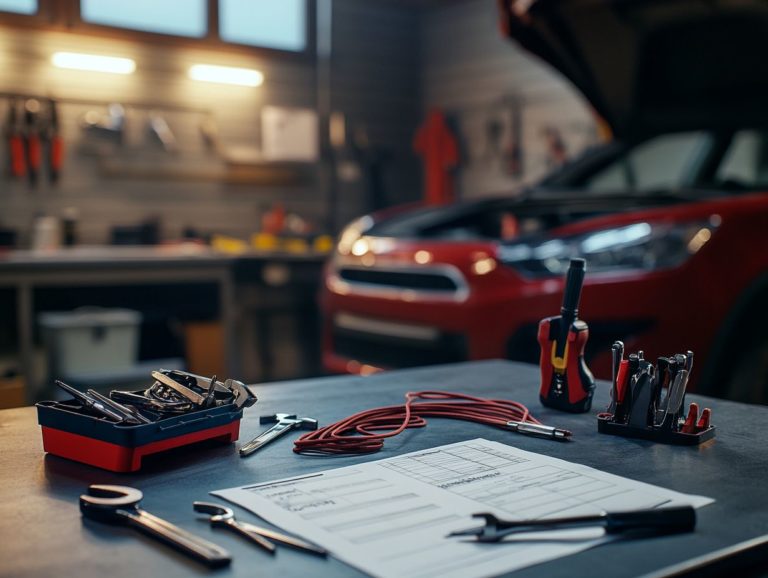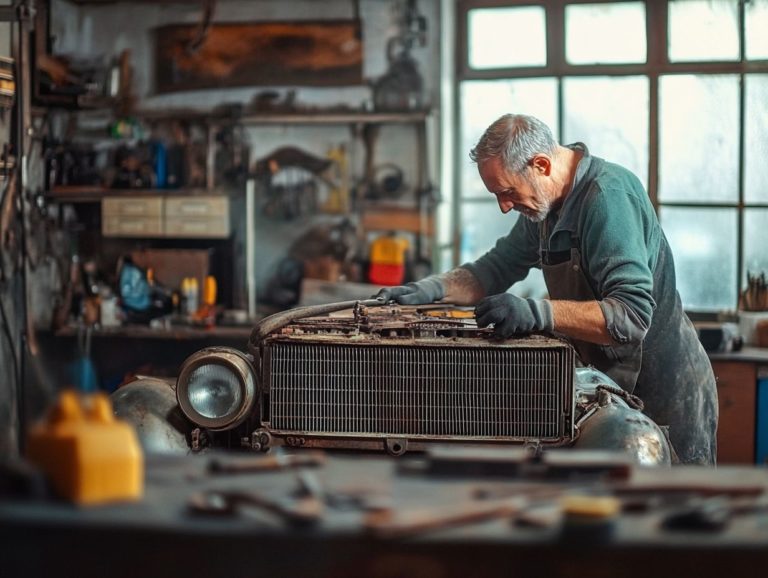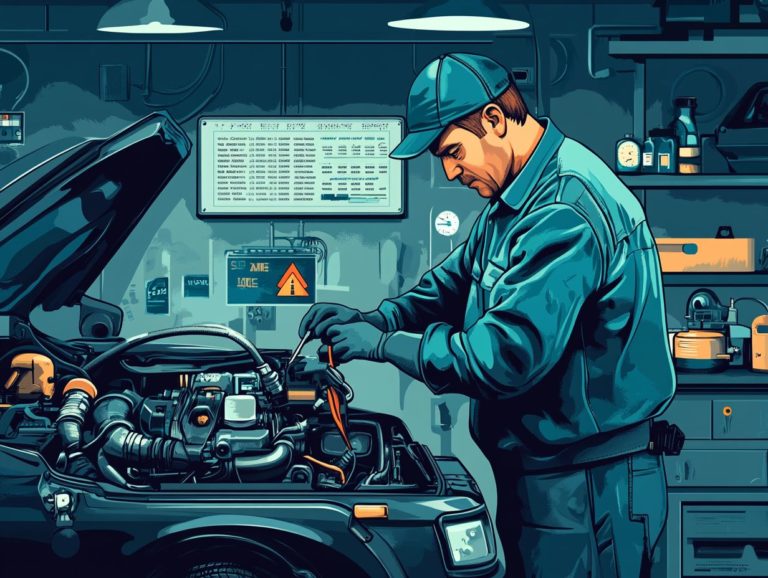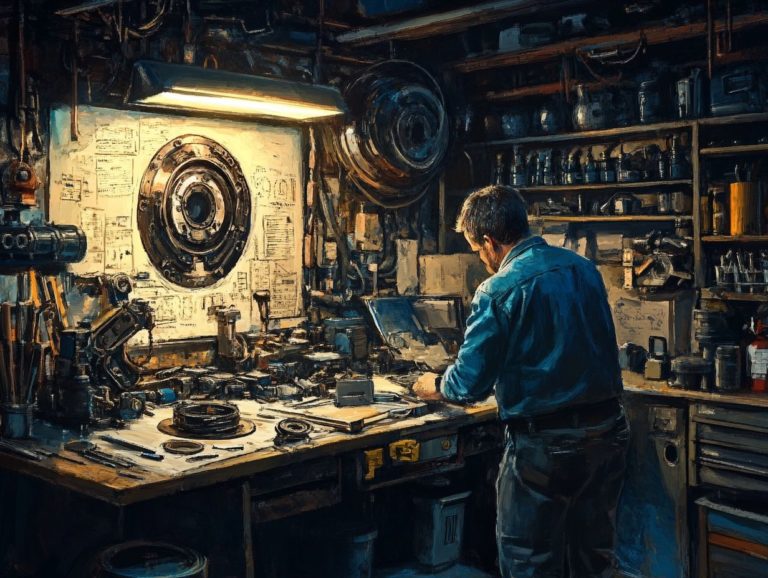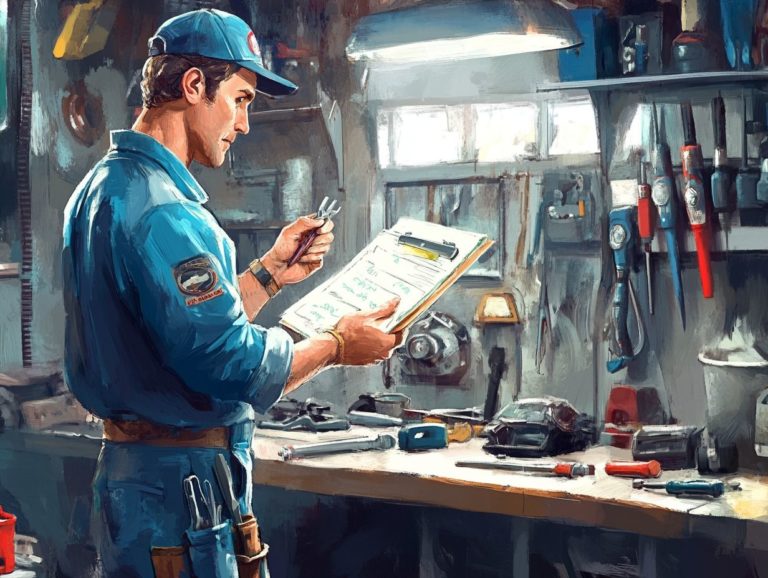Top 10 Most Common Car Repairs You Should Know
Car troubles can strike when you least expect them, leaving you feeling frustrated and overwhelmed. By understanding the most common car repairs, you can stay prepared and potentially save on costs.
From flat tires to fuel pump issues, this guide highlights the top 10 repairs you should know about, detailing their causes, preventative measures, symptoms to watch for, and typical costs.
You ll also discover whether these repairs are DIY-friendly or best left to the professionals.
Let s delve into the details!
Contents
- Key Takeaways:
- 1. Flat Tire
- 2. Dead Battery
- 3. Oil Change
- 4. Brake Replacement
- 5. Spark Plug Replacement
- 6. Air Filter Replacement
- 7. Ignition Coil Replacement
- 8. Alternator Replacement
- 9. Radiator Repair
- 10. Fuel Pump Replacement
- What Are the Most Common Causes of These Repairs?
- Frequently Asked Questions
- What are the top 10 most common car repairs that car owners should know?
- What are the signs that indicate my car needs one of the top 10 most common car repairs?
- Can I perform these top 10 most common car repairs myself, or should I take my car to a mechanic?
- How much do these top 10 most common car repairs typically cost?
- Can I prevent these top 10 most common car repairs from happening?
- What should I do if my car needs one of the top 10 most common car repairs while I’m on a road trip?
Key Takeaways:
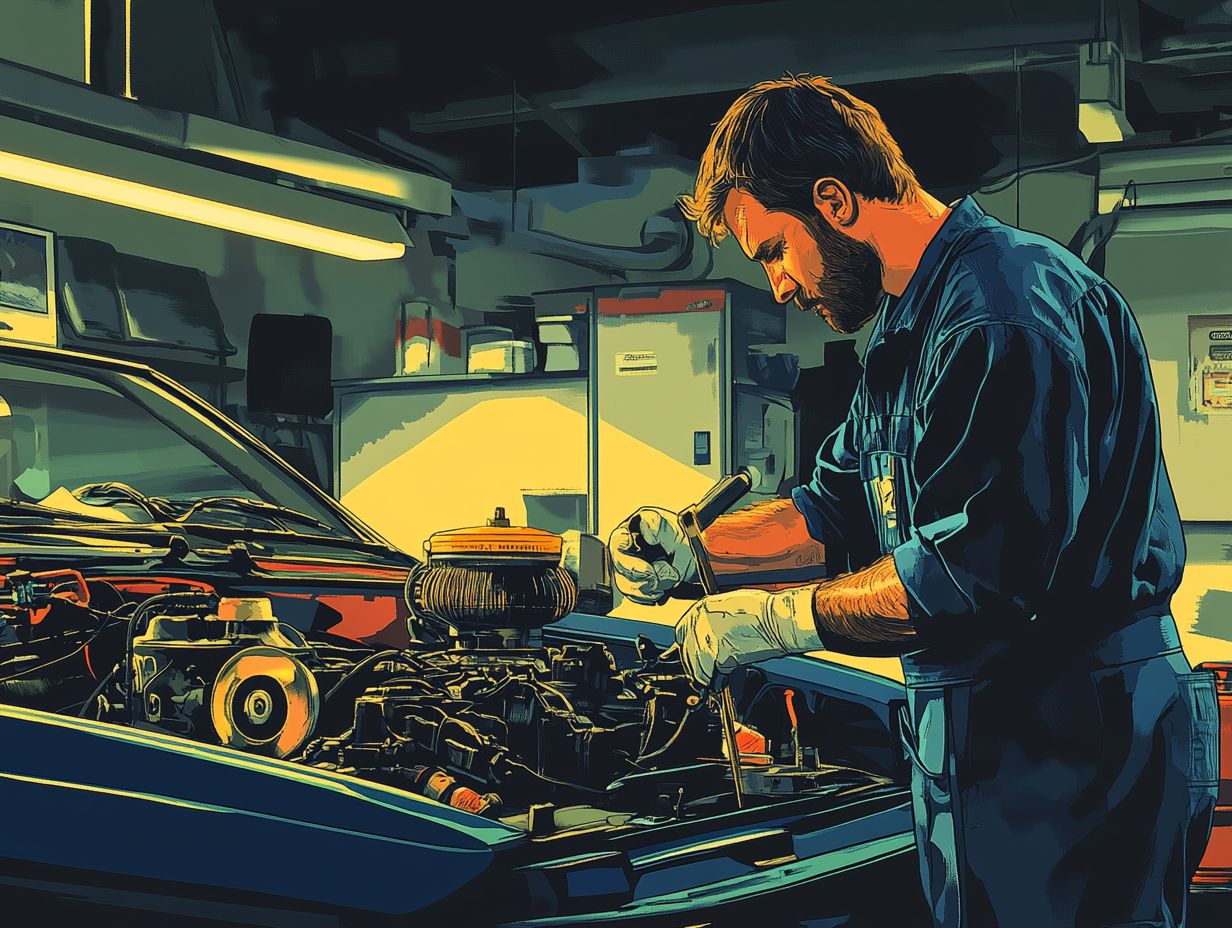
- Flat tires and dead batteries are the most common car repairs. Always have a spare tire and jumper cables on hand.
- Regular oil, air filter, and spark plug changes can prevent major engine issues.
- Address repairs promptly to avoid costly breakdowns and engine damage.
1. Flat Tire
A flat tire can lead to unexpected vehicle breakdowns. Understanding scheduled maintenance and timely tire replacement is essential for your safety.
You might often overlook common causes of flat tires, such as punctures from sharp objects or simple wear and tear over time. These issues can disrupt your daily commutes and pose serious safety risks.
Regular vehicle service checks can catch potential tire problems before they escalate, ensuring your tires remain in good shape. By investing in new tires, you significantly enhance your vehicle s performance, providing improved traction and handling key components for safe driving.
When you maintain your tires properly and replace them as needed, you can enjoy a smoother ride and greater peace of mind on your journeys.
2. Dead Battery
A dead battery ranks among the most frequent headaches for vehicle owners, often resulting from overlooked maintenance or the need for a timely replacement something that could be conveniently covered under an automotive warranty for extra peace of mind.
Spotting the early signs of battery trouble can save you from a frustrating breakdown! Warning signs include dim headlights, sluggish engine cranking, and electrical glitches. It s essential to adopt preventive measures like routine inspections.
Regular checks can reveal issues like corrosion, leaks, or waning battery life, allowing for timely replacements. Recent automotive research suggests that with the right care and maintenance, batteries can surpass their expected lifespan by a significant margin. By prioritizing these practices, you can enhance your car’s performance and reliability, ensuring you won’t face the inconvenience of an untimely battery replacement.
3. Oil Change
Regular oil changes are essential for maintaining optimal engine performance. They ensure that your oil filter remains clean and effective, preventing car parts from suffering due to neglect in your vehicle’s maintenance routine.
When you change the oil on time, you not only protect the engine from unnecessary wear and tear but also enhance overall vehicle performance, which can improve fuel efficiency and extend the lifespan of your car. It s generally wise to change the oil every 3,000 to 5,000 miles, depending on the type of oil you use and your manufacturer s recommendations. For instance, if you opt for synthetic oils, you might enjoy longer intervals between changes.
If your vehicle has high mileage, consider using high-mileage oil. This type contains additives specifically designed to significantly reduce engine wear. By sticking to a regular oil change schedule, you can ensure smoother operation and potentially save yourself from costly repairs in the future.
Keep your car in top shape by checking these repairs today! Don t wait until it s too late!
4. Brake Replacement
Brake replacement is a critical element of car maintenance. Ignoring brake issues can jeopardize your vehicle’s safety and lead to expensive repairs if problems go unnoticed.
Watch for clear signs that it’s time to replace your brakes:
- Unusual sounds like squeaking or grinding
- A decrease in responsiveness when pressing the brake pedal
To maintain optimal brake health, routine inspections and regular maintenance are essential. This includes checking the brake fluid and ensuring all components are in good working order.
By prioritizing these preventive measures, you can keep your vehicle safe and avoid unexpected repair costs.
5. Spark Plug Replacement
Spark plug replacement is a vital part of routine vehicle maintenance and engine tune-ups. When spark plugs fail, you may experience decreased engine performance and increased repair costs.
These small components generate the spark that ignites the air-fuel mixture the mix of air and gasoline your engine needs to run efficiently. If they wear out or become fouled, you might notice:
- Misfiring
- Poor acceleration
- Difficulty starting
Stay alert for signs of spark plug deterioration, such as reduced fuel efficiency or rough idling. Regular inspections will help you maintain optimal engine efficiency and extend your vehicle’s lifespan.
6. Air Filter Replacement
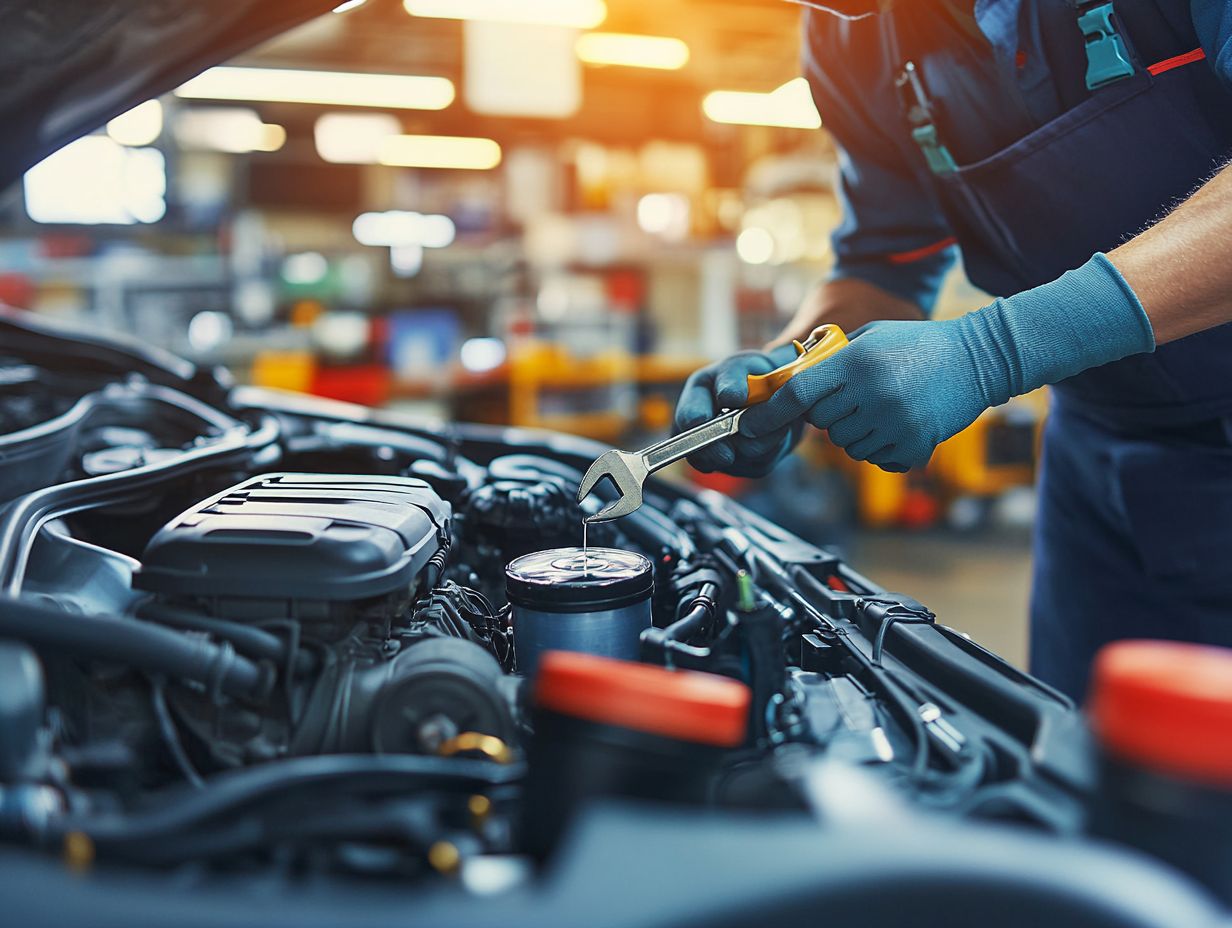
Regularly replacing your air filter is a fundamental part of vehicle maintenance that enhances engine performance and boosts fuel efficiency.
A clean air filter ensures optimal airflow to the engine, which is vital for combustion. A clogged filter can lead to:
- Decreased engine efficiency
- Subpar fuel economy
Check your air filter every 12,000 to 15,000 miles. Look out for warning signs like:
- Decrease in power
- Unusual engine noise
- Illuminated dashboard lights
If you notice any of these symptoms, it might be time to consider a replacement.
7. Ignition Coil Replacement
Ignition coil replacement is a crucial repair you shouldn’t overlook. Failing ignition coils can lead to engine misfires and decreased fuel efficiency.
Common symptoms of a failing ignition coil include:
- Rough idling
- Trouble starting the engine
- Stalling on the road
These signs typically indicate that the coil isn’t delivering the necessary voltage to the spark plugs effectively. Timely replacement is essential to avoid more severe engine damage.
By addressing ignition coil issues promptly, you can enhance your car’s reliability and save yourself from hefty repair bills.
8. Alternator Replacement
Alternator replacement is a crucial element of your vehicle’s service. It significantly influences the electrical system. Don t ignore warning signs! Address them now to avoid costly breakdowns later.
Recognizing the signs of alternator failure can spare you from larger, more costly problems down the line. Keep an eye out for common indicators, like warning lights on your dashboard especially that pesky battery alert. Also, watch for noticeably dimming headlights and any odd electrical behavior in your car. If the radio cuts out unexpectedly, these can also signal a weakening alternator.
Regular maintenance checks help spot issues early, allowing you to avoid substantial repair expenses from a total electrical failure. After all, nobody wants their daily life disrupted by inconvenient roadside emergencies.
9. Radiator Repair
Radiator repair keeps your car’s cooling system working properly. Neglecting this vital component puts you at risk of overheating and engine damage.
The radiator regulates your engine’s temperature, ensuring it runs efficiently. When it malfunctions, the heat generated can reach dangerous levels, potentially leading to catastrophic engine failures that are both costly and time-consuming to repair.
Regular maintenance and prompt repairs are essential. Incorporating antifreeze into your cooling system prevents freezing and boiling, protecting against common radiator issues.
10. Fuel Pump Replacement
Fuel pump replacement is an essential auto repair service. A malfunctioning fuel pump can severely impact engine performance, leading to escalating repair costs.
As a driver, you might encounter several warning signs pointing to a fuel pump issue. Look out for diminished fuel economy, engine sputtering during acceleration, or difficulties starting your vehicle.
If you overlook these indicators, you risk facing more significant failures that could prolong repair times and inflate expenses. Prioritize regular maintenance checks to allow technicians to diagnose and resolve potential issues before they escalate. This proactive approach saves you both money and stress, ensuring a smoother and more reliable driving experience.
What Are the Most Common Causes of These Repairs?
Understanding the most common causes of car repairs is vital for you as a vehicle owner. This knowledge enables you to take proactive steps in vehicle maintenance, reducing the chances of significant issues down the line.
One of the main culprits behind unexpected repairs is often the neglect of scheduled maintenance. When small problems are left unchecked, they escalate into larger, more costly issues. Environmental factors, like extreme temperatures and road salt, can accelerate wear and tear, leading to premature component failure.
By committing to regular inspections, you can identify potential problems early. Tackle minor concerns before they turn into expensive repairs. Stay vigilant and prioritize maintenance to significantly extend your car’s lifespan while ensuring it performs at its best.
How Can These Repairs Be Prevented?
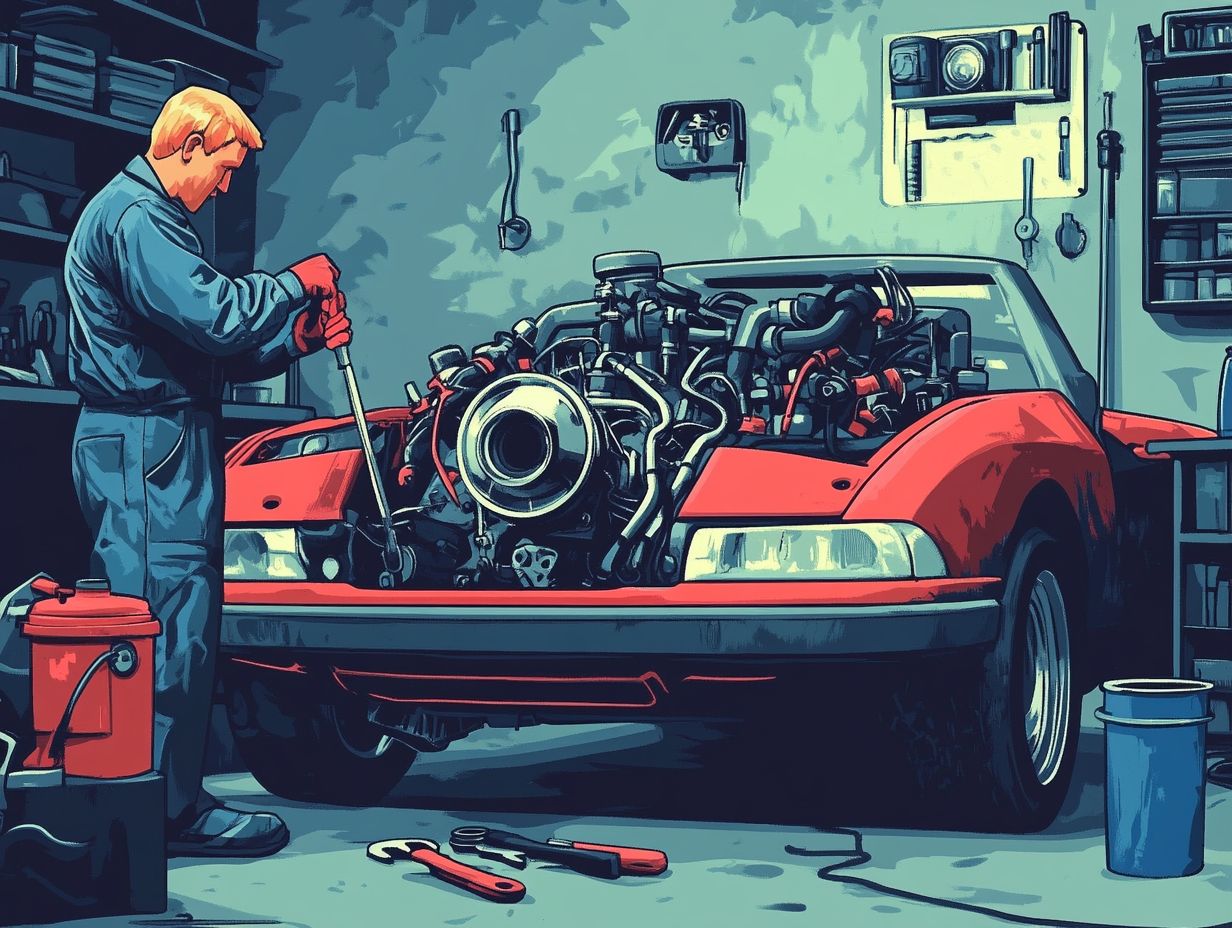
Preventing common car repairs is well within your grasp through consistent vehicle maintenance and a commitment to routine practices that prioritize car care.
Schedule inspections of essential components to stay ahead of repairs. By following the manufacturer s guidelines for regular oil changes, you can ensure that your engine operates smoothly and efficiently, minimizing wear over time.
Conducting routine brake inspections allows you to catch potential issues early, saving you both time and money on more extensive repairs down the road.
Don t overlook tire rotations; they are crucial for promoting even wear and extending the life of your tires. This directly contributes to better traction and handling.
By focusing on these maintenance tasks, you not only enhance your vehicle’s longevity but also improve safety on the road for yourself and others.
What Are the Signs That Indicate These Repairs Are Needed?
Recognizing the signs that your vehicle needs repairs is essential for you as a vehicle owner. Early detection of issues can help you avoid costly fixes.
Look out for common indicators like warning lights on your dashboard, unusual sounds such as grinding or squealing, and noticeable dips in performance or fuel efficiency. These are crucial alerts that something might be off under the hood.
Act quickly! Get your vehicle checked by a qualified technician today! Ignoring these symptoms could lead to serious complications and increased repair costs.
By paying attention to these early warnings and addressing them promptly, you not only protect your investment but also ensure a smoother, safer driving experience.
How Much Does Each Repair Typically Cost?
Understanding the typical repair costs associated with common vehicle issues enables you to budget effectively for automotive services. This helps you avoid unwelcome surprises when necessary repairs arise in the future.
By closely monitoring these expenses, you can make informed decisions regarding maintenance and repairs. Remember, various factors such as your vehicle’s make and model, regional labor rates, and severity of damage can significantly impact pricing.
For example, a luxury vehicle may come with higher repair costs due to the need for specialized parts or expertise, whereas a more common model often presents various budget-friendly options.
Discover amazing deals on repairs by comparing prices at different service centers, seeking out promotional deals, or exploring local mechanics who may offer competitive rates without compromising on quality.
Can These Repairs Be Done at Home or Should a Professional Be Consulted?
Determining whether you can handle car repairs at home or need to call in a professional is a vital decision for any vehicle owner. Proper consumer education on automotive services enhances your understanding and leads to safer and more effective maintenance.
You may find that simple tasks, such as changing the oil or replacing air filters, are well within your reach with just a few tools and some guidance from online tutorials.
However, more complex issues like brake system repairs or engine diagnostics usually require the expertise of trained technicians. It s essential to honestly assess your mechanical skills and the tools you have on hand before embarking on any repair project.
Recognizing your limits is key; it can save you from costly mistakes and ensure that your vehicle remains roadworthy with minimal risk.
What Are the Long-Term Effects of Ignoring These Repairs?
Ignoring necessary car repairs leads to serious long-term problems. Your vehicle s maintenance will become increasingly difficult.
This oversight can result in skyrocketing repair costs, lower engine power, and potential safety hazards that jeopardize both your safety and that of your passengers.
Neglecting these repairs shortens your vehicle s lifespan. It also increases the risk of performance issues that can disrupt overall drivability.
Major components might start to deteriorate more rapidly, leading to a domino effect of problems that could prove both expensive and time-consuming to resolve.
By scheduling regular inspections and addressing repairs promptly, you can significantly mitigate these risks. Don t wait! Schedule your inspection today to keep your car running smoothly.
This proactive approach allows you to maintain optimal performance and safety standards. By tackling minor issues as they arise, you enhance your vehicle’s reliability, ensuring a smoother and safer driving experience for years to come.
Frequently Asked Questions
What are the top 10 most common car repairs that car owners should know?

- Oil change – Regularly changing your car’s oil is essential for maintaining its engine and ensuring smooth performance.
- Brake pad replacement – Worn out brake pads can affect your car’s braking ability, making it crucial to replace them when needed.
- Battery replacement – Car batteries have a limited lifespan and should be replaced every 3-5 years to avoid breakdowns.
- Tire rotation – Rotating your tires every 5,000-7,000 miles helps to evenly distribute wear and extend their lifespan.
- Air filter replacement – A dirty air filter can decrease your car’s fuel efficiency and lead to engine problems if not replaced regularly.
- Spark plug replacement – Worn out spark plugs can cause your car to misfire or have trouble starting, making this a common repair.
- Coolant flush – Flushing your car’s coolant system every 2-3 years helps to prevent engine overheating and other cooling system issues.
- Windshield wiper replacement – Worn out windshield wipers can compromise your visibility while driving, making it important to replace them every 6-12 months.
- Headlight/taillight replacement – Burnt out headlights or taillights can put you at risk for a ticket or an accident, so be sure to replace them promptly.
- Serpentine belt replacement – This belt helps various parts of your engine work together and should be replaced every 60,000-100,000 miles to avoid breakdowns.
What are the signs that indicate my car needs one of the top 10 most common car repairs?
Signs that your car may need one of the top 10 most common car repairs include strange noises, dashboard warning lights, decreased performance, and visible wear or damage to specific parts. Understanding these issues can help you anticipate common car repair costs.
It’s important to address these issues promptly to avoid further damage and costly repairs.
Can I perform these top 10 most common car repairs myself, or should I take my car to a mechanic?
Some of these repairs, such as oil changes and battery replacements, can be done by car owners with some basic knowledge and tools.
However, for more complicated repairs like brake pad replacement or coolant flushes, it’s best to take your car to a trusted mechanic to ensure the job is done correctly.
How much do these top 10 most common car repairs typically cost?
The cost of these repairs can vary depending on the make and model of your car, as well as the location and labor costs of the mechanic.
On average, these repairs can range from $50-$200 each, but it’s always best to get a quote from a mechanic before proceeding with the repair.
Can I prevent these top 10 most common car repairs from happening?
While some of these repairs are inevitable due to regular wear and tear, proper car maintenance can help prevent some of them from happening.
Regularly checking and replacing fluids, inspecting and rotating tires, and addressing any issues promptly can help keep your car running smoothly and potentially avoid costly repairs.
What should I do if my car needs one of the top 10 most common car repairs while I’m on a road trip?
If you experience car troubles while on a road trip, the best course of action is to find a reputable mechanic or dealership in the area to have your car inspected and repaired.
If the cost is too high, consider getting a second opinion or temporarily fixing the issue to get you home safely before having it fully repaired by your trusted mechanic.

